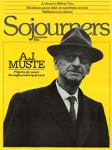For several years now, it has been a tradition here at Sojourners to feature in our December issue some person or group of people who has given flesh to the way of Christ in this world and whose lives speak to us of the hope of Christmas. The main idea behind what we've come to call our "incarnation" issues is that the incarnation of God in human history is both something that happened uniquely and decisively that long-ago night in Bethlehem and a process that continues in the ordinary history of our day. The role of the Christian community in our understanding is quite literally to be the body of Christ, continuing together the new life inaugurated in this world by Jesus.
We chose A.J. Muste for this year's Christmas issue partly because the 100th anniversary of his birth comes up next month on January 8, 1985. Also, Muste had long been a major movement hero for some of us here on the staff. He was at the forefront of every good fight for peace and justice from World War I to Vietnam.
In almost 60 years of activism, he never stopped experimenting with new tactics and ideas. If anything Muste became more radical and open to change as he grew into old age. As David McReynolds writes in this issue, Muste constantly searched for ways to drive the stake of moral principle into the hard ground of political reality. That is certainly one way of describing the incarnational task.
One of the great legends of the peace movement has it that when A.J. Muste was engaged in one of his many public demonstrations at a nuclear weapons base in the Cold War days of the 1950s, he was asked by a reporter what good he thought it did to stand his lonely vigil at such an obscure site. Muste answered, "I don't do this to change the world, I do it to keep the world from changing me." Perhaps the best thing that can be said about A.J. Muste is that he remained unchanged by the world.
The world couldn't change him because his commitment to the cause of peace was rooted in something much deeper than political rationale or intellectual persuasion, though he had a powerful command of those tools. Muste's 60-year-long career as a peacemaker and war resister was founded in the certainty that the nonviolent, self-sacrificing love seen in the person of Christ was the strongest force in the universe. He believed that the power of love, if humans ever allowed it full expression in their lives, was stronger than the power of great armies, historic empires, or even nuclear weapons.
This fall as I reacquainted myself with Muste's life and work, I also began to find in his life a source of hope and vision for myself and perhaps for our movement in what has been by any external standard a devastating and depressing political season. The example of a man who never lost hope and was a faithful voice of the prophetic minority through two world wars, a Great Depression, and the worst of the Cold War era makes an obstacle like Reagan's re-election landslide seem a little less insurmountable.
In the early days of World War II, when A.J. Muste was serving as executive secretary of the Fellowship of Reconciliation, he spoke of the historical period the world was entering as an equivalent of the Dark Ages. He encouraged those in the nonviolent movement to stand fast, deepen their commitments, and tend to their spiritual roots. He felt that the most important thing at that juncture was that "islands of safety and sanity" be preserved as clues to the future after the darkness had passed.
I've often thought about those few brave souls who maintained the nonviolent witness throughout World War II, not because they were naive about the threat of fascism, but because they saw the ultimate futility of defeating violence with violence. On the surface it must have seemed like the most quixotic of undertakings to stand against a war that was so universally and even enthusiastically supported. But they did it. Some of them even took the absolutist stance of refusing draft registration and were imprisoned. Muste himself refused registration when it was ordered for men 45 to 65.
Out of these resisters' lonely witness came the early stirrings of the civil rights movement and the movement for nuclear disarmament, a lively connection between Western pacifists and the anti-colonial movements of the Third World, and the integrity that kept the peace movement from being sucked into Cold War hysteria. Because they kept the flame of truth and love burning through the very worst times, they emerged able to offer hope to a world bent on self-destruction.
The lesson there for us is, I suppose, that there are worse things than another four years of Ronald Reagan. And one of them is for people who have caught a glimpse of the vision of peace, reconciliation, and justice to give up or compromise that vision just because it isn't currently popular. That would be letting the world change us.
As Muste himself once wrote when asked about the apparent failure of the peace movement, "Joy and growth come from following our deepest impulses, however foolish they may seem to some, or dangerous, and even though the apparent outcome may be defeat." That is the joy we are called to have among ourselves and to offer to the world in this season and even for four more years.
Danny Duncan Collum was an associate editor of Sojourners magazine when this article appeared.

Got something to say about what you're reading? We value your feedback!
